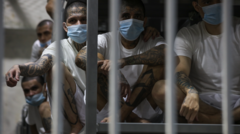El Salvador's President, Nayib Bukele, has put forward a proposition to exchange 252 Venezuelans who have been deported by the United States for an equivalent number of political prisoners detained in Venezuela. In a direct address to Venezuelan President Nicolás Maduro via social media, Bukele highlighted the serious crimes associated with many of the deportees, labeling them as individuals involved in "rape and murder." In contrast, he argued that the prisoners in Venezuela are incarcerated solely for opposing Maduro’s government, which continues to face accusations of human rights violations and political repression.
Bukele’s proposal, articulated in a post on X, emphasizes a humanitarian approach to the swap, soliciting the release of 252 Venezuelan political prisoners in exchange for the repatriation of the same number of deportees. Additionally, he referenced nearly 50 other prisoners of various nationalities, including some US citizens, as potential candidates for the swap.
The Venezuelan government has yet to respond publicly to Bukele’s offer. This development follows a recent wave where over 200 Venezuelans have been deported from the US to El Salvador, where they are reportedly held in a notorious high-security facility known for its stringent conditions. The Trump administration has accused these deportees of links to the violent Tren de Aragua gang.
Amid ongoing immigration challenges, the US Supreme Court recently intervened, requesting a halt to further deportations targeting alleged gang members, which the White House has condemned as unjust litigation. The use of the 1798 Alien Enemies Act, a legislative tool intended for wartime use, has facilitated these mass deportation efforts. While Bukele’s proposal could open dialogues, the conflicting narratives of political imprisonment highlight the complexities of international relations in the region.
Bukele’s proposal, articulated in a post on X, emphasizes a humanitarian approach to the swap, soliciting the release of 252 Venezuelan political prisoners in exchange for the repatriation of the same number of deportees. Additionally, he referenced nearly 50 other prisoners of various nationalities, including some US citizens, as potential candidates for the swap.
The Venezuelan government has yet to respond publicly to Bukele’s offer. This development follows a recent wave where over 200 Venezuelans have been deported from the US to El Salvador, where they are reportedly held in a notorious high-security facility known for its stringent conditions. The Trump administration has accused these deportees of links to the violent Tren de Aragua gang.
Amid ongoing immigration challenges, the US Supreme Court recently intervened, requesting a halt to further deportations targeting alleged gang members, which the White House has condemned as unjust litigation. The use of the 1798 Alien Enemies Act, a legislative tool intended for wartime use, has facilitated these mass deportation efforts. While Bukele’s proposal could open dialogues, the conflicting narratives of political imprisonment highlight the complexities of international relations in the region.





















